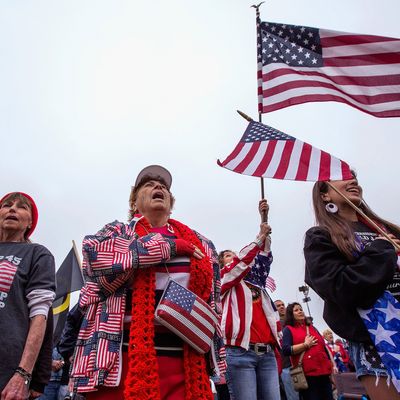
Fox News megastar and conservative opinion leader Laura Ingraham is getting some well-earned heat for an angry little meditation she offered up on her show Wednesday night. It was about how immigration and demographic change are ruining the country she says she loves:
“In some parts of the country, it does seem like the America that we know and love doesn’t exist anymore,” Ingraham said during a lengthy tirade against “the left’s effort to remake America.”
“Massive demographic changes have been foisted upon the American people, and they are changes that none of us ever voted for, and most of us don’t like. From Virginia to California, we see stark examples of how radically, in some ways, the country has changed.”
She insisted, of course, that her complaint was “not about race or ethnicity,” but about “respect for the rule of law and loyalty to our Constitution,” though she also made it clear she was offended by the fruits of legal as well as illegal immigration.
This is a fresh example of a very old phenomenon: right-wing super-patriots who don’t much seem to love, or even like, the America that actually exists.
This is the same Laura Ingraham who just last month was deploring the doubts being expressed about America’s goodness and righteousness by U.S. college students:
“It’s bratty,” said Ingraham, referring to the results of a video made by College Reform in which several college students expressed their frank lack of patriotism. “It makes my blood boil.”
Now it’s hardly news that conservatives who like to display their patriotism — and even jingoism — tend to think of “America” as a nostalgic concept that’s under subversive domestic attack. Trump’s “Make America Great Again” slogan works because it suggests the country has lost its greatness under previous regimes, and that it’s possible and even necessary to roll back the cultural, political, and, yes, demographic changes that have made the country feel alien to conservative white Christians. Even before Trump’s arrival, conservative despair about what America was becoming had become epidemic, as Ron Brownstein observed immediately after the 2012 presidential election:
Democrats are now operating with a largely coherent Coalition of Transformation that will allow (and even pressure) them to align more unreservedly with the big cultural and demographic forces remaking America.
For better or worse, this election more clearly stamped the Republicans as a Coalition of Restoration, overwhelmingly dependent on the votes of whites unsettled by those changes. After Obama’s victory, conservative grandees such as Rush Limbaugh and Bill O’Reilly portrayed the election as something like the Alamo, with true Americans overrun by hordes of benefit-grubbing minorities and young people. “We are outnumbered,” Limbaugh despaired.
The growing belief on the right that America-as-we-have-known-it was being destroyed by a conspiracy of liberal elites and “takers” was based on all sorts of scattered evidence. One big clue, supposedly, was Barack Obama’s 2008 election-eve statement that he aimed at “fundamentally transforming the USA” — a vague and meaningless bit of rhetoric to non-ideologues, but a rare, honest admission to many conservatives. And this sense of imminent disaster built on years of barely submerged anti-Americanism on the right in the right-to-life movement, with its habit of treating the U.S. as analogous to Nazi Germany, and the militia movement — and its larger cousin, the Second Amendment absolutists — with its ready embrace of
extra-constitutional violence, a.k.a. incipient treason.
Beyond this time and place, of course, the admixture of super-patriotic rhetoric with hatred of many of one’s actual countrymen has been a staple of extreme right-wing politics — a phenomenon with no real analogue on the left. Historian Kevin Kruse offered this comment on Ingraham’s screed:
Abroad, of course, all of the right-wing authoritarian political movements of the twentieth century involved hypernationalism married to an angry denunciation of existing parliamentary democracies, cosmopolitan culture, and ethnic diversity as decadent if not satanic. “Make ____ Great Again” could have been a slogan for the right in many countries.
To be very clear, I am not saying that Ingraham or the many millions of Americans who share her fears about the changing nature of America are fascists. But it would be helpful if they acknowledged the ambivalence of their own patriotism, and exhibited less iron certainty about the lack of patriotism of their political opponents.
This could soon become a less-theoretical issue. The election of Donald Trump as president seems to have both inflated the displays of conspicuous patriotism among conservatives and shown how powerfully they dislike much of what their country has become and is becoming. The sentiments expressed in the famous essay, “The Flight 93 Election,” by future (if now former) White House staffer Michael Anton, suggesting that America itself might not survive Hillary Clinton’s elevation to the presidency, are not really that exotic among the kind of people who thought Trump should “lock her up” after winning the presidency. How will they respond to a bad midterm election for Trump’s party or the rejection of Trump himself in 2020?
As Ingraham implies, Trump hasn’t yet turned back the dusky tide of un-Americans who are making America un-American. If he fails, or isn’t given enough time to MAGA, then at what point will it be time for right-wing “patriots” to indulge their growing disdain for their country in even less orthodox ways? It’s truly an open, and frightening, question.






























